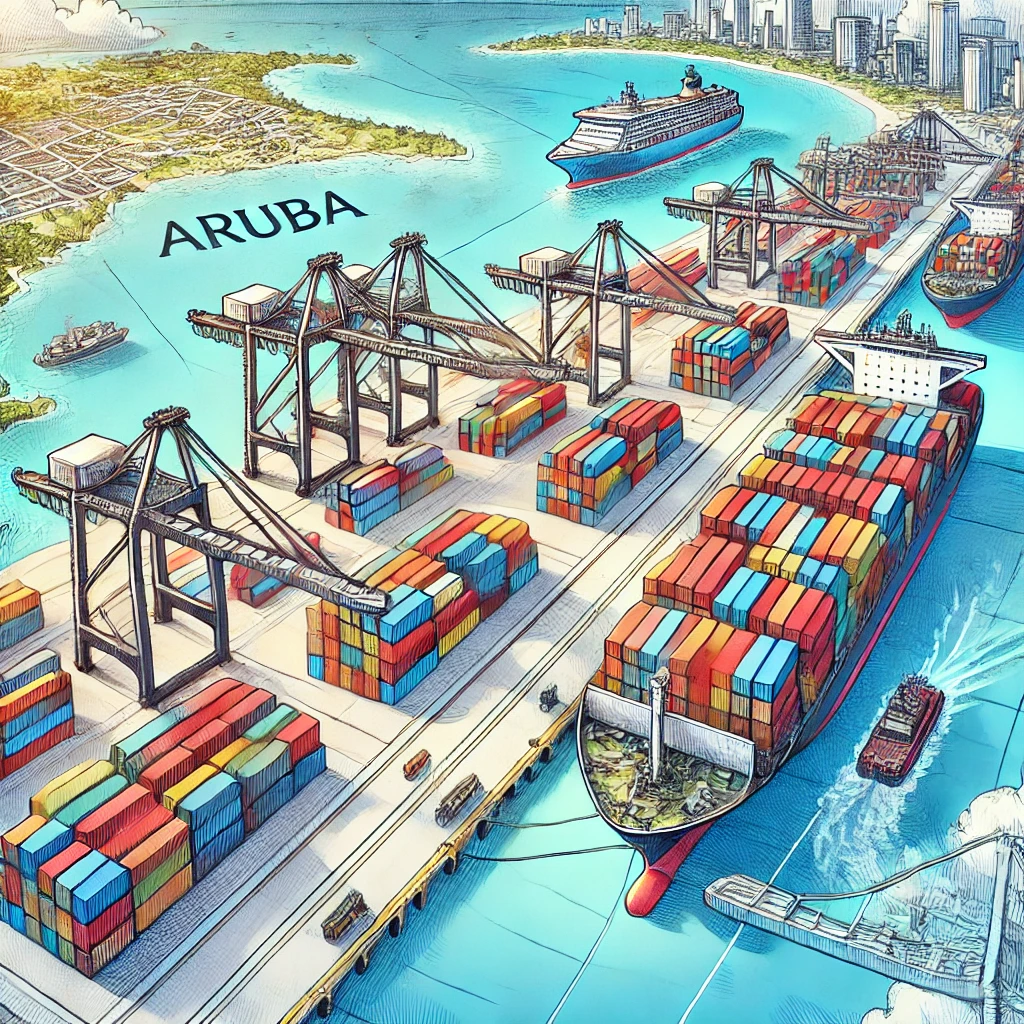Miami Port Strikes: What It Means for Aruba and the Wider Caribbean Economy
The recent strikes at major U.S. ports, including the Port of Miami and other East Coast and Gulf Coast hubs, are ringing alarm bells for Caribbean economies like Aruba and Curaçao, which rely heavily on imports from the United States. As labor disputes escalate between the International Longshoremen’s Association (ILA) and the U.S. Maritime Alliance (USMX), the economic ripple effects are starting to be felt across the region. Miami is a critical gateway for imports into Aruba and Curaçao, and prolonged disruptions could severely impact supply chains and local economies.
The Cause of the Strikeå
The strikes began in early October and are driven by two primary issues. First, the ILA, representing around 45,000 dockworkers along the U.S. East and Gulf Coasts, demands an 85% wage increase. The USMX countered with a 50% wage hike, but the ILA rejected this offer, leading to a full-blown strike. Second, the union opposes the growing automation of port operations – a trend that threatens to replace many jobs in the long run.
While the ILA has suspended strikes until mid-January after a tentative agreement on wage increases, the dispute is far from over. The strike has already caused significant delays, especially at ports like Miami, which is crucial for Caribbean imports.
How the Strike Affects Aruba and Curaçao
For Aruba and Curaçao, the effects of the U.S. port strikes have been somewhat insulated so far, but this could change rapidly. Both islands depend on a steady flow of goods from U.S. ports, and any prolonged disruption could seriously affect their supply chains.
According to the Aruba Trade and Industry Association (ATIA), while immediate effects have been limited, businesses are already preparing for potential shipping delays, price hikes, and surcharges. In Curaçao, local shipping agents such as SEL Maduro & Sons and Dammers Group have warned that the island could see delayed container arrivals and higher shipping fees if the strikes continue.
Miami’s ports are important in maintaining Aruba’s supply chain, particularly PortMiami and Port Everglades, two important hubs for the island’s imports. PortMiami, often called the “Cargo Gateway of the Americas” handles over 1.25 million TEUs of containerized cargo annually and provides direct shipping routes to Aruba. Similarly, Port Everglades serves as a primary feeder for Aruba, facilitating essential weekly shipments via shipping lines like King Ocean. Any disruption at either port can significantly affect Aruba, delaying essential goods and driving up costs.
What is TEU?
TEU stands for Twenty-Foot Equivalent Unit, a standard measurement used in the shipping industry to quantify cargo capacity. One TEU represents the dimensions of a standard 20-foot-long shipping container. The TEU describes the cargo capacity of container ships and ports, with each container typically measuring 20 feet in length, 8 feet in width, and 8.5 feet in height.
A 40-foot container is equivalent to 2 TEUs because it’s twice the length of a 20-foot container. TEUs provide a standardized way to assess and compare cargo volume handled at ports or transported by ships globally.
Potential Impact on Cruise Ship Operations
Beyond cargo disruptions, the strikes at PortMiami and other U.S. ports could also affect cruise ships that frequently depart from Miami and travel to destinations like Aruba. PortMiami, one of the busiest cruise ports globally, could face operational delays due to labor disputes. Cruise schedules could be impacted if dock workers cannot assist with essential tasks such as boarding, baggage handling, or fueling. This may lead to itinerary changes or rerouted ships to alternative ports like Port Everglades or Fort Lauderdale. Aruba, unfortunately, still promotes this type of tourism heavily. The longer the disruptions persist, the more likely cruise lines will need to adjust routes, which could diminish the flow of cruise passengers into Aruba.
Cruise ship tourism
This disruption in port operations may also provide an unintended opportunity for Aruba to reconsider its reliance on cruise tourism. In several of my previous columns, I’ve voiced my views on the current cruise tourism model, noting its long-term adverse effects on the island. Cruise visitors provide only a short-term economic boost, while their sheer volume strains local infrastructure and often leaves minimal revenue for the local economy. The environmental damage and crowding caused by mass tourism have made it clear that this model is unsustainable in the long run.
Given the potential pause in cruise arrivals due to port strikes, Aruba might benefit from reassessing its future as a cruise destination. This unexpected break could serve as a real-world example of what closing Aruba as a cruise port might look like – and it could allow the government to see firsthand how focusing on higher-value, low-impact tourism might better serve the island in the long term. Fewer cruise ships lead to a more manageable flow of tourists, higher income for the island, and more significant benefits for local businesses. This might be the turning point for us to reconsider the role of cruise tourism in Aruba’s future.
For readers who want more context, I’ve discussed this in-depth in my previous articles in Part 1: Are We Better Off Without Cruise Ships? and Part 2: Why Aruba Should Consider Reducing Its Reliance On Cruise Ships. Reliance And Not Dependence, which highlights unsustainable tourism practices.
Key Impacts:
- Rising Shipping Costs: Due to the strike, freight costs are climbing. Depending on size, Aruba and Curaçao may face surcharges of up to $1,500 to $3,780 per container. Curaçao shipping agents note that some shipping lines have already imposed extra fees to cover operational disruptions caused by the strike. Since both islands calculate import duties based on the cost of goods plus freight and insurance, these higher shipping costs will inevitably increase consumer prices.
- Delays in Perishable Goods: Aruba and Curaçao could see shortages in fresh produce, especially refrigerated items like fruits and vegetables. The current disruption in the flow of refrigerated containers, or “reefers,” is already leading to delays in key supply routes. Curaçao’s general managers from major shipping companies have expressed concern over potential route diversions, which could block the smooth flow of goods through key hubs like Jamaica and Panama. Aruba is similarly vulnerable, with the holiday season looming large.
- Price Increases on Consumer Goods: Beyond immediate shipping delays, the costs of labor disputes in the U.S. are likely to be passed down the line to consumers in the Caribbean. Higher shipping fees, delays, and increased tariffs could cause noticeable price hikes for essential goods. Curaçao shipping companies have already reported surcharges being levied by U.S. shipping lines, exacerbating the situation.
A Strained Regional Supply Chain
Aruba and Curaçao rely heavily on imports, making them particularly vulnerable to global logistics disruptions like the Miami port strikes. Local businesses on both islands are already feeling the pressure, with some seeking alternative suppliers or boosting their inventories in anticipation of shortages.
The problem is compounded by alternative regional ports, such as Panama and Colombia, which are less efficient and already face congestion. Curaçao’s shipping firms have highlighted that large container ships offloading in Jamaica, Panama, or Cartagena face delays, which could force them to divert to less optimal routes. Aruba’s reliance on Miami’s Port Everglades, a key hub for weekly shipments to the island, means that even minor disruptions can snowball into significant logistical issues for the island’s businesses and consumers. We have seen produce shelves in our supermarkets quickly empty when a weekly sailing is delayed by one week.
Long-Term Implications
If the U.S. labor dispute isn’t resolved soon, Aruba and Curaçao could face lasting economic impacts. Increased shipping costs and shortages of essential goods could drive inflation, raising living expenses for residents and pushing up operating costs for businesses. This would be particularly challenging for Aruba, where the tourism and retail sectors are major economic drivers and heavily dependent on affordable imports. Curaçao, a regional hub for transshipment, also risks economic strain if shipping lines continue to impose hefty surcharges and delays on their operations.
What Can Be Done?
Given their dependency on U.S. imports, mainly through the Miami port, there are limited immediate solutions for Aruba and Curaçao to sidestep the impacts of the strike. However, some strategies could help mitigate the fallout:
- Diversify Suppliers and Stockpile: Local businesses should consider diversifying their supply chains, even temporarily relying on more expensive or distant sources. Stockpiling essential goods like non-perishable food items can also help buffer against shortages in the short term.
- Government Intervention: Governments in both Aruba and Curaçao might need to step in to cushion the blow – temporary relief measures, such as reducing import duties. ATIA has suggested that lowering import duties could be a viable short-term solution to offset these increased costs. By shifting the duty calculation from the CIF value (cost, insurance, freight) to the FOB value (Free on Board), the government could help alleviate some financial pressure on businesses and consumers. This would reduce the import tax burden, particularly in light of the additional surcharges imposed by shipping companies due to the ongoing strikes. Such measures should be taken sooner rather than later.
- Regional Collaboration: Both islands could explore strengthening relationships with alternative regional ports. Though less efficient than U.S. routes, developing stronger ties with Panama, Jamaica, or Colombia could provide a much-needed backup plan for future disruptions in U.S. shipping lanes.
Conclusion: Prepare for Ripples
The ongoing strikes at U.S. ports, particularly in Miami, remind us of how interconnected the global economy is. Labor disputes thousands of miles away can disrupt supply chains in Aruba, Curaçao, and the broader Caribbean region, driving up prices and threatening the stability of local economies. This situation is a stark reminder that Aruba is interconnected with the U.S. economy. The saying “if the U.S. sneezes, Aruba catches a cold” perfectly captures how labor disputes and economic disturbances in the U.S. can ripple across the Caribbean.
As we monitor the situation, businesses and governments must stay flexible and prepare for potential ripple effects. While we hope for a swift resolution to the strikes, proactive measures must be taken to protect the economy from further shocks.
Until next time, stay informed and prepared. For more insights on Aruba and the region’s economy, visit my website at www.lincolngomez.com. See you next week!















